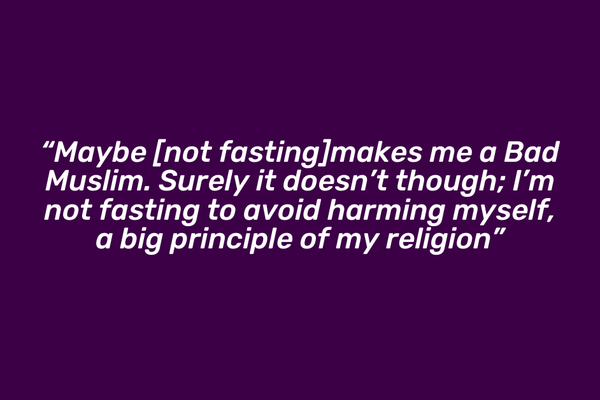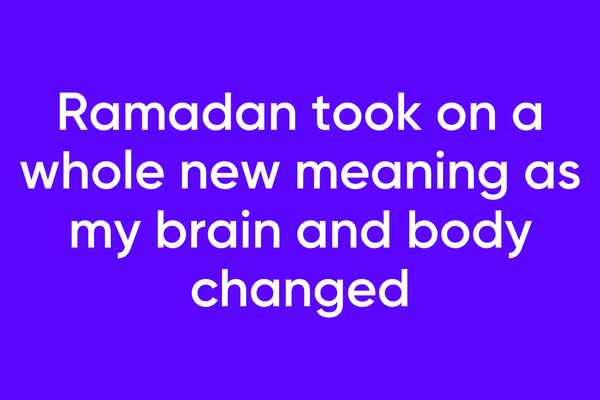As a recovering anorexic and bulimic, following Beat on social media felt like my own way of supporting “the cause” - whatever the root cause of an eating disorder ever is to anyone who has suffered body dysmorphia issues. Even today, I still get asked, “but why did you just stop eating?” And even now, my answer remains the same - I just don’t know. I don’t know if there was just one single trigger or multiple factors that spiralled into me feeling as worthless as I did back then (and sometimes still do).
In all honesty, it was pure curiosity rather than contribution that led me to follow other people’s stories of recovery on Beat’s website. But there was one blog published by a survivor about dealing with anorexia during the holy month of Ramadan - where many Muslims observe a strict fast between sunrise and sunset - that has encouraged me to share, if not why, but at least how I easily lost my sense of self-worth.
Adult anorexia was an alien concept to me. Growing up as a teenager in the 90’s, void of the internet, hearing the term anorexia or bulimia was often associated with younger people who looked really unwell. My family were also very aware of the dangers of vulnerable teenagers succumbing to peer pressure. I still recall at the age of 15, I initially felt I was unconsciously bullied for weighing more than my so-called friends at the time. I say unconsciously, because I don’t think these girls realised the impact they had on my well-being when I was forced to weigh myself in their “who is skinnier competition”. That is until my mum called their behaviour out, and boldly claimed, “no child of mine is going to starve themselves because of bullies.” I love my mum.
As the first born of my generation in the UK, heralding from a South Asian household, I have been raised as an independent woman with strong family alliances. Naturally, there was no shortage of cross-cultural differences between my Western surroundings and my Indian heritage, but it never deterred me from being immersed in my Hindu and Sikh culture. Food holds a prominent role in Indian households - it’s always cooked for the masses - simply because we associate Indian cuisine with an attachment to family love. Quenching my thirst of self-identification, I actively took part in cultural festivities that brought me closer to my heritage - which often included observing fasts.
The act of fasting for different Hindu events in the religious calendar varies - but for most that I was aware of, at least one main meal a day was allowed. History dictated that young teenage girls taking part in what is known as the “Jayaparvati” fasts for 5 days would ensure a good husband (although my Mr Right seems to have still lost his way!). I've never been overtly religious by any means - my participation with some of my other girlfriends was a nod to our sisterhood and an excuse to get together.
Yet as my unmarried status in my early 30’s remained stagnant, surrounding society’s obsession to ensure women be married at the “right age” rapidly rose. I found myself, along with many other single South Asian friends, observing fasts on certain days for specific deities in the hope of no longer being a bridesmaid, but a bride.
It was literally contradictory to everything that I believed I had stood for - a woman not being defined by societal norms. I naively followed the herd anyway. Fasting wasn't so much physically difficult, but much more emotionally draining as I grappled with my own values versus what was perceived as doing the right thing to obtain a fulfilled life. Was this actual belief or a fear of speaking out about self-worth? How much harm could it have really done?
The “Shravan” fast, is one of the most renowned fasts observed by Jains (of Hindu origin), which can last for a month in the summer. Many of my family members take part by restricting their food routine to one simple meal a day. Similar to other religious fasts, it was also seen as an opportunity to detox both the body and mind and be grateful to God (or whoever you choose to believe in) for the simple pleasures in life that we often take for granted. In the summer of 2008, when I had decided to take my grandmother to India in the last week of Shravan, I decided, well why not fast with her and give her the moral support, unaware of how I let this one choice spiral out of control.
Coupled with my new exercise routine earlier that year, a month of fasting felt simple enough to complete. I knew I was hardly doing this for the greater good, but if my grandmother could do it and travel, so could I. We returned, showered with compliments on how good we looked; it was a rare feeling, which somewhere along the road, led to desperation of not wanting to lose that sentiment. I had always been a petite person who never cared for the scales that lay collecting dust in the back cupboard, but I couldn’t deny this validation, and the fasting felt like the only part of my life that I knew would be in my full control.
The need to self-control is a common trait of those suffering from eating disorders. The months that followed saw me adopt a new “normal” amplified by the smallest of triggers. Every time a feeling of not being enough rose, the ability to restrict meals became easier and unknowingly dangerous. I had exploited the concept of why such fasts were practised to satisfy my own ego. I suppressed this shame and continued anyway, because it became a part of who I am and ultimately my new best friend. Anorexia was the outlet, the relief - it was the one thing I could claim as my own. It knew me, understood me, and never judged. If ever I was placed in situations that required consuming above my own “allowance”, I turned to laxatives to “remove” the collateral - because I had betrayed my best friend, so I had to be punished.
My entire day would be consumed with thoughts of how I could avoid being in environments that involved food - the ultimate enemy. The lack of required nutrition impacted not just my weight, but I had suddenly aged. Gone were the thick curly locks that now looked like a bed of straw. My face was sullen, and I had no notion of how to be in the present moment. I was there but I wasn’t. Days, weeks and months passed as a blur and wine became my confidante - aiding me in switching off from the noise. Concerns of my well-being fell to deaf ears - I didn’t want to escape - I was addicted to the self-harm bubble I was enveloped in. I profusely denied for months that I had a problem even though my behaviour became visibly aggressive before I accepted that I needed help.
Recovery was slow and sometimes hindered by comments of how I was just seeking attention. From the outset, the perception was that I had everything - and I do. Friends, family, a home, a good job - but my mind was working overdrive with the need to constantly self-validate the only way I knew how. The long-term effects of my persistent “fasting” resulted in severe IBS, lazy bowels and my digestion could be disrupted at the drop of a hat because I had become so accustomed to eating the bare minimum.
I found myself re-learning everything that I had already known - that food was fuel. I had to learn to fall in love with what kept me alive all over again, which wouldn't have been possible without the support of family, even though family gatherings were (and still are) the most challenging environments to be in. But the feeling of being enough was and still is a constant work in progress.
Social media is abuzz with fitness and nutritional advisors often promoting intermittent fasting and I often wonder, how many are out there, like me, who jumped on the bandwagon for the wrong reasons. Religious fasts in particular hold such personal meaning to those who keep them as a ritual, but there was never any awareness or open conversations questioning the emotional impact it can have to those who may have a less strong state of mind. Nor were there conversations as to why women are still made to feel incomplete - through the encouragement of fasting as young as 15 just to find “The One”. If it is subconsciously ingrained within us from an impressionable age, that we are only whole once there is a ring on our finger, what message are we echoing to the next generation?
I no longer take part in any religious fast, acknowledging what route it could lead me to. Nor do I question other’s beliefs in wanting to continue to do so - I would like to think that I respect people’s personal reasons in doing so... But I hope by sharing this, I can invite others to voice that there is no shame in not wanting to observe fasts, if deep down it’s not aligning with your morals - we are enough as we are. And I’m still on that journey to hold on to that belief.
Contributed by Sejal
If you've been affected by any of the issues raised in this story, or are concerned for yourself or a loved one, you can find support and guidance on the help pages of our website.
Help us change lives
Donate today to help us provide more vital support to people like Sejal.
"I used to fast for all the wrong reasons" - Ayisha's Ramadan recovery story
11 March 2024Our supporter Ayisha explores her experiences of navigating Ramadan while in recovery from her eating disorder
"Ramadan took on a whole new meaning as my brain and body changed"
21 April 2022Anonymous discusses the pressures and expectations during Ramadan and how they're putting their recovery first.
Fighting My Eating Disorder in Ramadan
25 May 2017Fasting during Ramadan is advised only for those who are healthy. Those who are sick in any way or mentally unwell are exempt.

